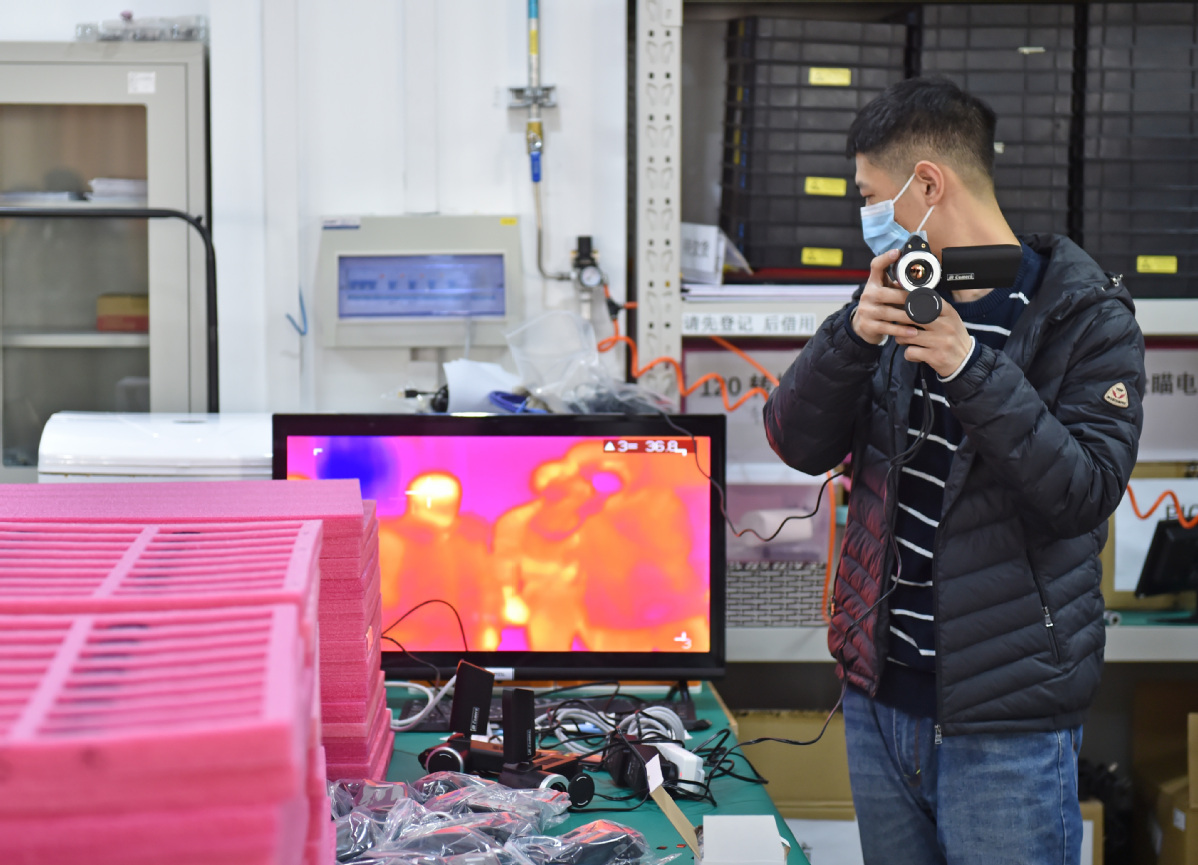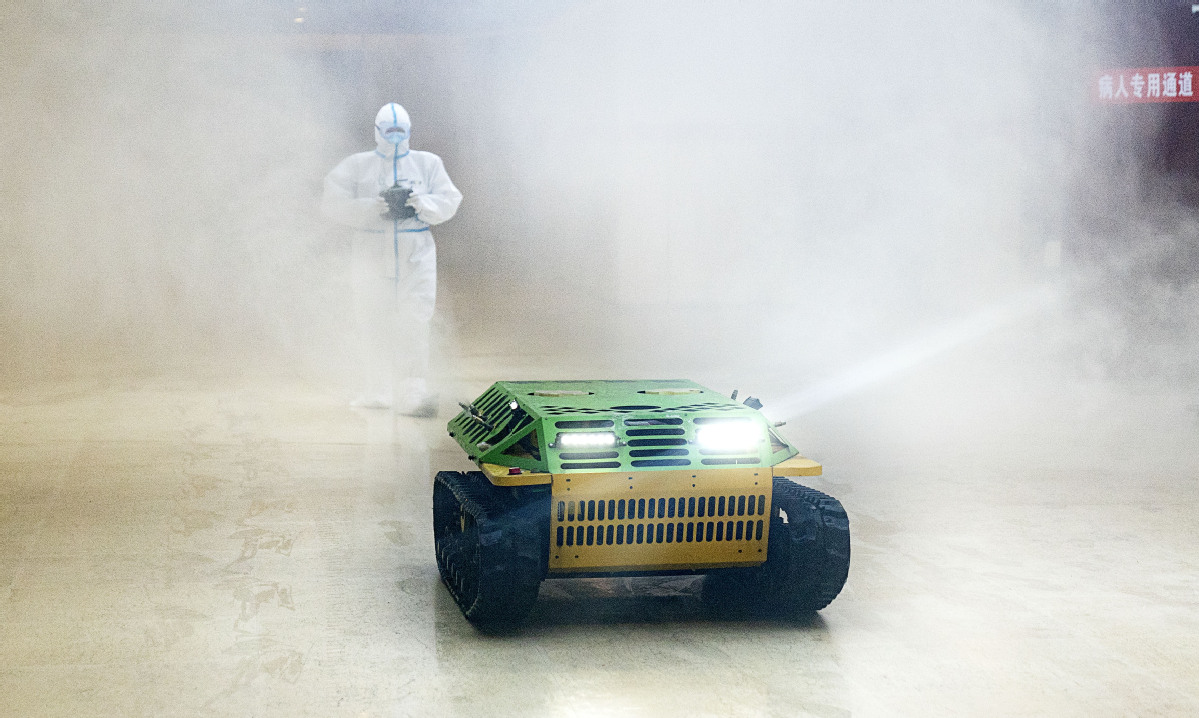
From the People's Daily App.
This is Story in the Story.
Since the coronavirus outbreak emerged in China, state-of-the-art technologies have been used in daily lives and also in the fight against what has since become a global pandemic.
The application of such technologies to contain the outbreak stems from China's long-time input into their research and development.
With the outbreak preventing many people from returning to work and living a normal life, high-tech enterprises have been quick to develop targeted AI and 5G-enabled solutions for different virus control scenarios, providing frontline workers with more flexibility and convenience.
Remote healthcare services powered by 5G are among the most eye-catching applications, providing technological support to ensure quality communication services for hospitals.
Analysts have said the outbreak could be a key point for emerging technologies, just as the SARS outbreak in 2003 triggered an e-commerce explosion in China.
Today’s Story in the Story looks at how technological innovation in China has received an unexpected push from the coronavirus outbreak.

A fever-screening product is tested at a company in the Zhongguancun science and technology area in Beijing. (Photo: Xinhua)
Wang Jiayi, a 31-year-old fashion magazine editor living in Tongzhou District of Beijing, is relying on a vending machine powered by artificial intelligence at her residential compound to supply her with fresh fruit, vegetables and other necessities.
"I select products displayed on the transparent door of the machine and use my mobile to scan a quick response code. Once it is scanned, the door opens and payment is processed automatically after I make my selection and close the door," Wang said.
The entire process is convenient and requires no human-to-human contact, she added.
Market research company International Data Corp has forecast that the outbreak will bring opportunities for 5G applications, remote offices and online activities, unmanned commerce and services, fresh-food e-commerce and online education.
Wang Zhiqin, deputy head of the China Academy of Information and Communications Technology, a government think tank also known as CAICT, said China is entering a critical period of 5G network construction, with more than 550,000 new base stations expected to start operating by the end of this year.
In the battle against the virus, a string of smart robots powered by 5G technologies are working with medics in Shenzhen, Guangdong.
Developed by Chinese AI pioneer UBTech, these robots are being used at the Third People's Hospital of Shenzhen to offer medical advice, deliver drugs and to disinfect wards and other areas. They can also check a patient's temperature and perform a range of other work.
Liu Yue, head of the hospital's fever outpatient services, said a robot equipped with an AI-enabled fever-screening system can take the temperatures of 200 people in just one minute.
"It greatly reduces our burden, and it can also prevent us from missing infected patients," Liu added.

An AI robot disinfects the makeshift Fangcang hospital in Wuhan, Hubei province. (Photo: Xinhua)
Xiang Ligang, director-general of the Information Consumption Alliance, a telecom industry association, said the outbreak can inject new development momentum into the digital economy in the long run by promoting the transformation of a large number of traditional industries.
Alibaba's all-in-one mobile workplace DingTalk has served more than 10 million enterprises and over 200 million people. Meanwhile, to meet the rapidly rising demand for remote offices, Tencent Meeting, which provides free, unlimited use for up to 300 participants per audio or video conference, has increased its computing resources capacity by adding more than 100,000 cloud servers.
Shoppers are steering clear of bricks-and-mortar stores and switching to online purchasing, with e-commerce platforms that deliver daily necessities and fresh produce witnessing a significant increase in business.
The consultancy Analysys Qianfan said transactions on the fresh-food platform Missfresh surged by 350 percent year-on-year during the holiday.
Raymond Wang, partner at global consultancy Roland Berger, said: "The outbreak has further proved the importance of the internet and digital economy. For example, the e-commerce and online-to-offline, or O2O, business model has solved people's daily requirements, while the traditional retail industry has taken a big hit."
Many AI companies have tweaked algorithms and upgraded gadgets, systems and technologies in a variety of ways to adapt them to fight the virus.
Yitu Technology, an AI startup, has developed an intelligent imaging evaluation system to help diagnose COVID-19.
The system provides efficient and accurate decision-making basis for clinicians and helps with infection prevention and control.
Measuring body temperature is also important in curbing the spread of the virus. SenseTime, an AI pioneer specializing in computer vision and deep learning, has come up with a screening system for fever that integrates sophisticated AI algorithms with infrared thermal technology.
Raymond Wang said, "AI helps a lot with medicine development, epidemic forecasting and control, and AI-driven robots will take more responsibility, especially in situations where no contact is expected."
(Produced by Nancy Yan Xu, Lance Crayon, Brian Lowe and Da Hang. Music by: bensound.com. Text from China Daily.)


